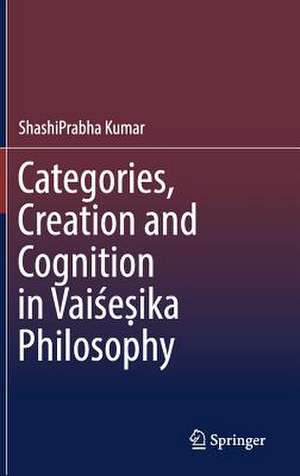Categories, Creation and Cognition in Vaiśeṣika Philosophy
Autor ShashiPrabha Kumaren Limba Engleză Hardback – 24 mai 2019
Preț: 585.57 lei
Preț vechi: 688.92 lei
-15% Nou
Puncte Express: 878
Preț estimativ în valută:
112.05€ • 117.30$ • 92.71£
112.05€ • 117.30$ • 92.71£
Carte tipărită la comandă
Livrare economică 07-21 aprilie
Preluare comenzi: 021 569.72.76
Specificații
ISBN-13: 9789811329647
ISBN-10: 9811329648
Pagini: 196
Ilustrații: XV, 187 p. 2 illus.
Dimensiuni: 155 x 235 mm
Greutate: 0.46 kg
Ediția:1st ed. 2019
Editura: Springer Nature Singapore
Colecția Springer
Locul publicării:Singapore, Singapore
ISBN-10: 9811329648
Pagini: 196
Ilustrații: XV, 187 p. 2 illus.
Dimensiuni: 155 x 235 mm
Greutate: 0.46 kg
Ediția:1st ed. 2019
Editura: Springer Nature Singapore
Colecția Springer
Locul publicării:Singapore, Singapore
Cuprins
Chapter 1. Veda and Vaiśesika.- Chapter 2. Yoga and Vaiśesika.- Chapter 3. Concept of Categories in Vaiśesika.- Chapter 4. Vaiśesika Theory of Creation.- Chapter 5. Atomic Theory of Vaiśesika.- Chapter 6.Vaiśesika Insights into Science.- Chapter 7. Consciousness and Cognition in Vaiśesika.- Chapter 8. Sabda in Vaiśesika.- Chapter 9. Hermeneutical Principles in Vaiśeṣika.- Chapter 10. Niḥśreyasa in Vyomavatī.- Chapter 11. Are the Vaiśeṣikas Pāśupatas.- Chapter 12. Ethics in Vaiśesika.- Chapter 13. Recent Sanskrit Commentaries on Vaiśesikasutras.- Chapter 14. Vaiśesika Studies Across the World.
Notă biografică
ShashiPrabha Kumar, PhD, is currently dean, Sri Sankaracarya Sanskrit Mahavidyalaya, Bharatiya Vidya Bhavan, New Delhi. Till recently (2017), she worked as the senior most faculty member at the Special Centre for Sanskrit Studies, Jawaharlal Nehru University, New Delhi, India. Earlier she was the first Vice-Chancellor at Sanchi University of Buddhist-Indic Studies, Bhopal, Madhya Pradesh, India. Through her career spanning forty five years, Professor Kumar has taught Sanskrit studies in general and subjects of Indian philosophy in particular. Her field of specialisation is the Vaiśeṣika system of Indian philosophy, and areas of interest are Vedas, Upanisads and Bhagavadgita. She has 30 books and more than 150 research papers to her credit. Some of her recent publications are Sutra, Smrti and Sastra (New Delhi: 2016), Drops of Vedic Nectar (Delhi: 2016), Sanskrit Studies III (Delhi: 2014), Classical Vaiśeṣika in Indian Philosophy (Oxford: 2013), Sanskrit Across Cultures (Delhi: 2007), Sanskrit and Other Indian Languages (Delhi: 2007), Veda as Word (Delhi: 2006). She is the recipient of several awards, including the President’s Certificate of Honour in Sanskrit (2014).
Textul de pe ultima copertă
The proposed book presents an overview of select theories in the classical Vaiśeṣika system of Indian philosophy, such as the concept of categories, creation and existence, atomic theory, consciousness and cognition. It also expounds in detail the concept of dharma, the idea of the highest good and expert testimony as a valid means of knowing in Vaiśeṣika thought. Some of the major themes discussed are the religious inclination of Vaiśeṣika thought towards Pasupata Saivism, the affiliation of the Vaiśeṣika System to the basic foundations of Indian philosophical thought, namely Veda and Yoga, and their insights into science, hermeneutics and metaphysics. In addition, this book includes recent Sanskrit commentaries on key Vaiśeṣika texts and provides a glimpse of Vaiśeṣika studies across the world. Overall, this book enunciates the Vaiśeṣika view from original sources and is an important work for Vaiśeṣika studies in current times for serious students as well as researchers.
Caracteristici
A key resource based on primary Vaise?ika texts Promises to be of interest for beginners as well as advanced researchers Provides both a historical account of Vaise?ika thought and current status of Vaise?ika studies across the world
